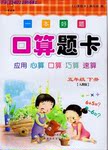题目内容
Kids should be encouraged to participate in community activities, ______ the voluntary sprit can take root in their minds from childhood.
A. now that B. in that C. such that D. so that
D

练习册系列答案
 一本好题口算题卡系列答案
一本好题口算题卡系列答案
相关题目
题目内容
Kids should be encouraged to participate in community activities, ______ the voluntary sprit can take root in their minds from childhood.
A. now that B. in that C. such that D. so that
D

 一本好题口算题卡系列答案
一本好题口算题卡系列答案